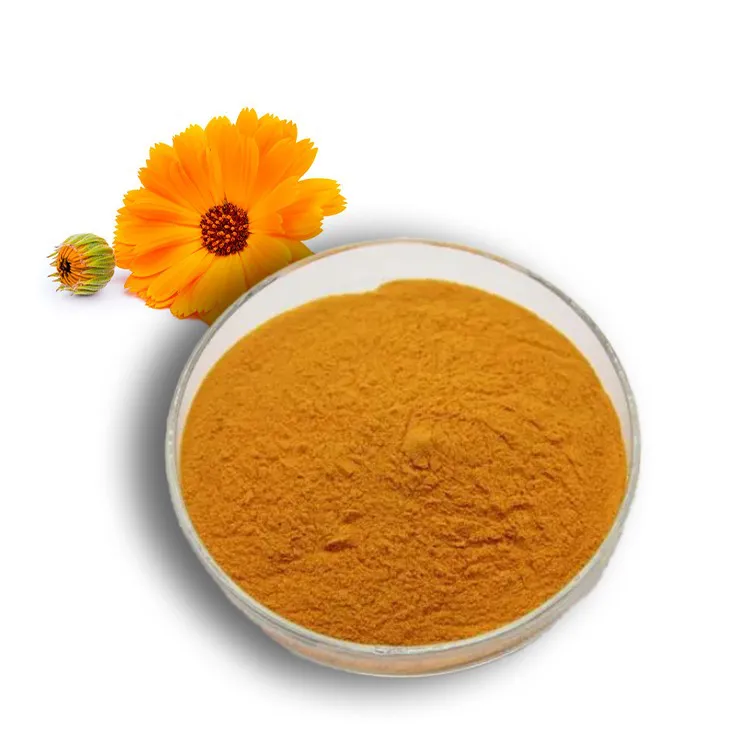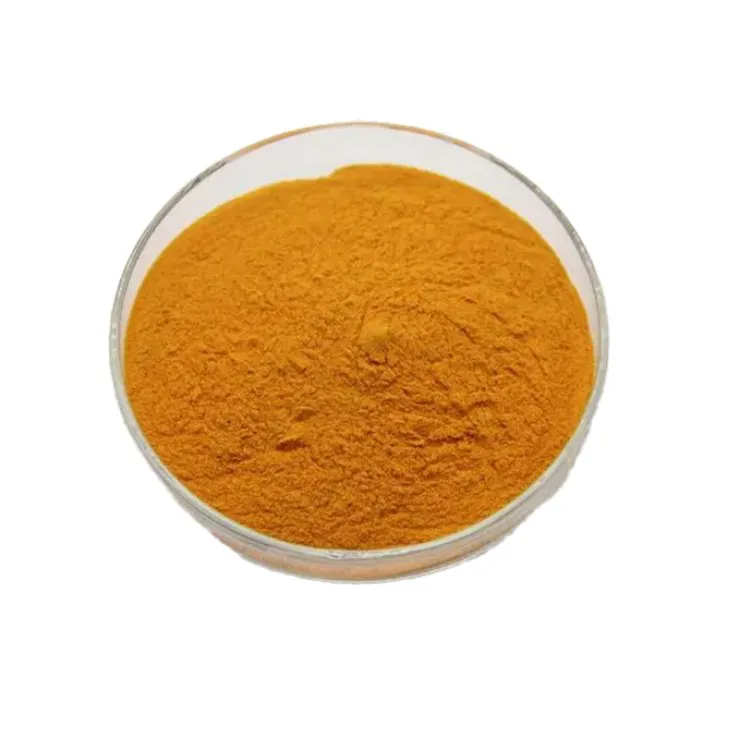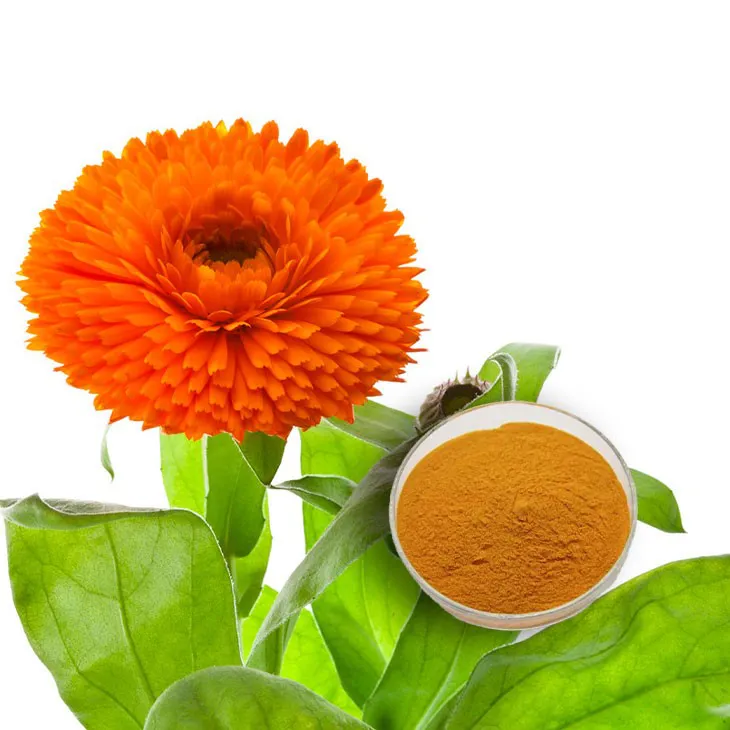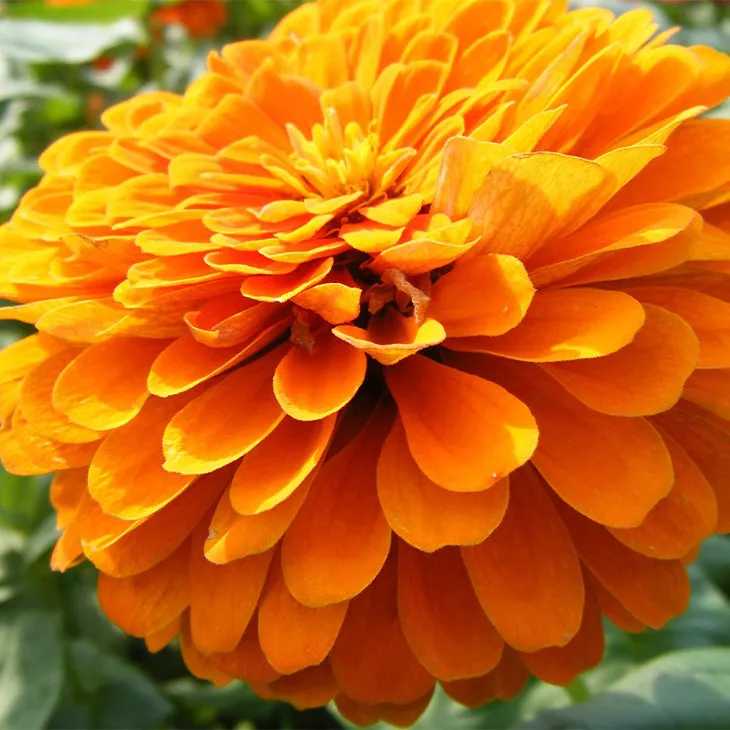- 0086-571-85302990
- sales@greenskybio.com
The Best Herb for Treating Anxiety and Insomnia: Calendula Extract.
2024-11-14

1. Introduction
Anxiety and insomnia are two prevalent health concerns that significantly impact the quality of life for a large number of individuals. In modern society, stressors such as work pressure, financial difficulties, and relationship problems often lead to increased levels of anxiety, which in turn can disrupt sleep patterns and cause insomnia. Traditional medicine has long been exploring natural remedies to address these issues, and among them, Calendula officinalis extract has emerged as a potentially promising option.

2. Understanding Calendula
Calendula, also known as pot marigold, is a well - known plant with a long history of medicinal use. It is native to southern Europe but is now widely cultivated around the world.
2.1 Botanical Features
Calendula is an annual or biennial herbaceous plant. It has bright yellow or orange - colored flowers that are not only aesthetically pleasing but also the main source of its medicinal properties. The plant typically grows to a height of about 30 - 70 centimeters and has hairy leaves.
2.2 Historical Use
Throughout history, Calendula has been used in various cultures for different medicinal purposes. In ancient Greece and Rome, it was used to treat skin diseases and wounds. In traditional Ayurvedic medicine in India, it was employed for its anti - inflammatory and analgesic properties. In medieval Europe, Calendula was often used in herbal remedies for digestive problems and as a general tonic.

3. Medicinal Properties of Calendula
Calendula contains a rich array of bioactive compounds that contribute to its medicinal properties.
3.1 Anti - Inflammatory Effects
One of the key properties of Calendula is its anti - inflammatory action. It contains compounds such as flavonoids, triterpenoids, and polysaccharides that have been shown to inhibit the production of pro - inflammatory cytokines. Inflammation in the body can be a contributing factor to anxiety. Chronic stress can lead to low - grade inflammation in the nervous system, which may disrupt the normal functioning of neurotransmitters and neural pathways related to mood regulation. By reducing inflammation, Calendula may help to alleviate anxiety symptoms.
3.2 Antioxidant Effects
Calendula is also a potent antioxidant. It contains substances like carotenoids and flavonoids that can scavenge free radicals in the body. Oxidative stress is another factor associated with anxiety and insomnia. Free radicals can damage cells in the nervous system, including neurons and the supporting glial cells. This damage can affect the normal communication between nerve cells and disrupt the sleep - wake cycle. The antioxidant properties of Calendula can help to neutralize free radicals, protecting the nervous system from oxidative damage and potentially improving both anxiety and sleep problems.

4. Calendula and the Nervous System
The relationship between Calendula and the nervous system is complex and multi - faceted.
4.1 Interaction with Neurotransmitters
Studies suggest that Calendula may interact with neurotransmitters in the brain. Neurotransmitters such as serotonin, dopamine, and gamma - aminobutyric acid (GABA) play crucial roles in regulating mood, anxiety, and sleep. For example, GABA is an inhibitory neurotransmitter that helps to calm the nervous system. Calendula may enhance the activity of GABA receptors or increase the production of GABA in the brain, leading to a more relaxed state. Serotonin is also important for mood regulation, and Calendula may influence serotonin levels in a positive way, thus reducing anxiety and improving sleep quality.
4.2 Effects on Neural Pathways
Calendula may also have an impact on neural pathways involved in anxiety and sleep regulation. It could potentially modulate the activity of the hypothalamic - pituitary - adrenal (HPA) axis, which is a key part of the body's stress response system. When the HPA axis is over - activated due to chronic stress, it can lead to increased levels of stress hormones such as cortisol, which are associated with anxiety and sleep disturbances. Calendula may help to regulate the HPA axis, restoring normal hormonal balance and reducing anxiety - related symptoms.

5. Research on Calendula for Anxiety and Insomnia
There have been several studies exploring the use of Calendula for treating anxiety and insomnia.
5.1 Animal Studies
In animal models, Calendula Extract has shown promising results. For example, in a study on rats exposed to chronic stress, those given Calendula Extract exhibited reduced anxiety - like behaviors compared to the control group. The rats showed less freezing behavior in a fear - inducing environment and had lower levels of stress hormones. In another study on mice with sleep disturbances, Calendula treatment improved the sleep architecture, increasing the amount of non - rapid eye movement (NREM) sleep, which is important for restorative functions.
5.2 Human Studies
Although human studies on Calendula for anxiety and insomnia are relatively limited, there are some positive findings. In a small - scale clinical trial, participants with mild to moderate anxiety who took Calendula supplements reported a reduction in anxiety symptoms after a few weeks of treatment. They also reported an improvement in sleep quality, with less difficulty falling asleep and fewer awakenings during the night. However, more large - scale, well - designed human studies are needed to further confirm these results.
6. How to Use Calendula for Anxiety and Insomnia
There are different ways to use Calendula for treating anxiety and insomnia.
6.1 Calendula Tea
One of the simplest ways is to make Calendula tea. To make the tea, you can use dried Calendula flowers. Boil a cup of water and add about 1 - 2 teaspoons of dried Calendula flowers. Let it steep for 5 - 10 minutes, then strain and drink. Drinking this tea before bedtime may help to relax the body and mind, promoting better sleep. It can also be consumed during the day to help reduce anxiety.
6.2 Calendula Supplements
Calendula supplements are also available in the form of capsules or tinctures. When choosing a supplement, it is important to ensure that it is from a reliable source. Follow the recommended dosage instructions on the product label. However, it is advisable to consult a healthcare provider before starting any new supplement, especially if you are taking other medications or have underlying health conditions.
6.3 Topical Application
Although topical application of Calendula is mainly used for skin conditions, some people believe that massaging Calendula - based creams or oils on the temples or the soles of the feet can have a relaxing effect and potentially help with anxiety. However, there is currently limited scientific evidence to support this claim.
7. Precautions and Considerations
While Calendula is generally considered safe for most people, there are some precautions to keep in mind.
7.1 Allergic Reactions
Some individuals may be allergic to Calendula. Allergic reactions can range from mild skin rashes to more severe symptoms such as difficulty breathing. If you have a known allergy to plants in the Asteraceae family (which Calendula belongs to), it is best to avoid using Calendula products.
7.2 Drug Interactions
Calendula may interact with certain medications. For example, it may potentiate the effects of anticoagulant medications, increasing the risk of bleeding. If you are taking any prescription medications, it is important to inform your doctor before using Calendula products.
8. Conclusion
In conclusion, Calendula officinalis extract shows great potential as a natural remedy for treating anxiety and insomnia. Its anti - inflammatory, antioxidant, and neuro - modulating properties make it a promising candidate. However, more research is needed to fully understand its mechanisms of action and to confirm its effectiveness in larger human populations. With proper precautions, Calendula can be a valuable addition to the holistic approach in managing anxiety and insomnia, offering a natural alternative for those seeking relief from these common health problems.
FAQ:
What is Calendula officinalis?
Calendula officinalis is a plant that has been known for its various medicinal properties. It is often used in herbal medicine.
How does Calendula Extract reduce anxiety?
Calendula contains compounds that have anti - inflammatory and antioxidant effects. These effects could contribute to reducing anxiety - related inflammation and oxidative stress in the body. Also, it may interact with neurotransmitters in a way that promotes relaxation.
Can Calendula extract really improve sleep?
Studies suggest that Calendula extract may interact with neurotransmitters in a beneficial way for sleep. By promoting relaxation, it may help in improving the quality of sleep, which can be beneficial for those suffering from insomnia.
Are there any side effects of using Calendula extract for anxiety and insomnia?
While Calendula is generally considered safe, some people may experience allergic reactions. However, more research is needed to fully understand any potential side effects when using it specifically for treating anxiety and insomnia.
How should Calendula extract be taken for treating anxiety and insomnia?
The method of taking Calendula extract can vary. It can be taken as a tincture, in capsule form, or as an ingredient in herbal teas. However, it is important to consult a healthcare provider before starting any new treatment regimen.
Related literature
- The Medicinal Properties of Calendula officinalis: A Review"
- "Calendula Extract and Its Impact on the Nervous System"
- "Anti - Inflammatory and Antioxidant Effects of Calendula in Relation to Anxiety and Insomnia"
- ▶ Hesperidin
- ▶ citrus bioflavonoids
- ▶ plant extract
- ▶ lycopene
- ▶ Diosmin
- ▶ Grape seed extract
- ▶ Sea buckthorn Juice Powder
- ▶ Beetroot powder
- ▶ Hops Extract
- ▶ Artichoke Extract
- ▶ Reishi mushroom extract
- ▶ Astaxanthin
- ▶ Green Tea Extract
- ▶ Curcumin Extract
- ▶ Horse Chestnut Extract
- ▶ Other Problems
- ▶ Boswellia Serrata Extract
- ▶ Resveratrol Extract
- ▶ Marigold Extract
- ▶ Grape Leaf Extract
- ▶ blog3
- ▶ blog4
- ▶ blog5
-
Organic Tongkat Ali extract powder factory.
2024-11-14
-
How to make powder with ashwagandha extract.
2024-11-14
-
Rosehip extract manufacturers from China.
2024-11-14
-
The best cat's claw extract in nature.
2024-11-14
-
Chinese Dandelion Leaf Extract Suppliers.
2024-11-14
-
Lemon Juice Powder
2024-11-14
-
Tinospora cordifolia extract
2024-11-14
-
Panax Ginseng Leaf Extract
2024-11-14
-
Plantain extract
2024-11-14
-
Red Date Extract
2024-11-14
-
Medicinal Marshmallow Extract
2024-11-14
-
Agaricus Blazei Extract
2024-11-14
-
Jujube Extract
2024-11-14
-
Tongkat Ali Extract Powder
2024-11-14
-
Senna Leaf Extract
2024-11-14





















